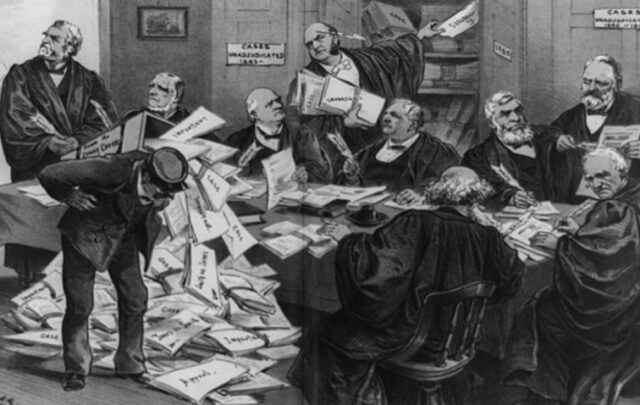Any conception of a degrowth society requires a fundamental change in our communal definition of existence. For centuries, we have upheld a Cartesian view of reality: an irreducible duality between mind and matter, body and soul, enshrined in Descartes’ famous dictum Cogito, ergo sum (I think, therefore I am). This conception of existence has placed humanity among an external, material environment and has rationalized the conversion of this environment for resources, production, and profit. Our long-held perception of dualism has enabled the capitalist machine to grow and sprawl unabated, leading us to the crossroads we now lie at, facing food shortages, energy crises, and ecological collapse.
The capitalist ethos is built around an inherent pursuit of growth for growth’s sake and pits individuals against each other, spurred on by the necessity to consume or perish. Its systemic pervasiveness means that the solutions to these imminent crises must address the very frameworks within which the problems are embedded. The transition to a degrowth economy must begin with a collective reimagination of what it means to be human.
Where then do we begin? How can we do away with the growth-centric paradigms that govern our everyday decisions? Can we break free from the structures that create these choices? We may be able to draw some inspiration from the philosophies and cosmologies of the Indigenous peoples of Sub-Saharan Africa and South America.
The concept of Ubuntu, stemming from the Bantu languages in Southern Africa, rose to mainstream prominence during the 1980s and 1990s when one of its major proponents, Desmond Tutu, was appointed by Nelson Mandela, another advocate of this philosophy, as Chair of the post-Apartheid Truth and Reconciliation Commission in South Africa. The philosophy has been concisely articulated in the phrase “I am because we are” (Mugumbate & Nyanguru, 2013, p. 84) and emphasizes the role of the communal experience in shaping the individual. Ubuntu calls for the individual to act with responsibility, care, and harmony towards others in order to improve the experience of all those around them and thus their own.
“My humanity is bound up in yours. I wouldn’t know how to be a human being on my lonesome,” says Desmond Tutu. “I have to learn from other human beings how to be human. I am only human because you are” (Mugumbate & Nyanguru, 2013).
A magnificent interconnectedness takes shape behind this simple phrase. Your experience of the world, your senses, thoughts, beliefs, actions, and words are one formative piece of the matrix that is my experience. Your experience shapes the senses, thoughts, beliefs, actions, and words of everyone around you, and vice versa. Through such a relationship, each one of us constitutes a nexus in the grand network of communal human experience. Philosopher John Mbiti (1997) captures this interconnectivity and is somewhat evocative of Western constructivist theory in the following:
Only in terms of other people does the individual become conscious of his own being, his own duties, his privileges, and responsibilities towards himself and towards other people. (p. 106) Where eminent constructivist philosophers Jean Piaget and Lev Vygotsky assert the importance of human interaction and culture in the cognitive development of a child (Mooney, 2013), Ubuntu extends similar tenets to the very nature of being. Community and interaction are not just tools to facilitate or enhance existence—they are existence. Being is made possible only through the experience of one another.
In evaluating the application of Ubuntu, African philosophers do not ignore the distinctions between different peoples, tribes, and cultures. Instead, they view each as but another manifestation of “a unified form of knowledge” (Mangena, 2014). Thus, any being capable of experience exists through the experience of everyone around them. Mbiti continues:
“when he suffers, he does not suffer alone but with the corporate group; when he rejoices, he rejoices not alone but with his kinsmen, his neighbours, and his relatives whether dead or living” (Mbiti, 1997, p. 106).
Since gaining popularity three decades ago, Ubuntu has been represented in various cultural settings to exemplify community, solidarity, and oneness among humanity. It has also been revered by Western heads of state as a spiritual aspiration for society. Barack Obama referred to it as “the ties that bind the human spirit” in a speech at the Nelson Mandela Memorial in 2018 (The Washington Post, 2018). Bill Clinton also iterated the importance of society through Ubuntu in 2006 (The Clinton Foundation, 2007) with reference to how genetically similar human beings are. While serving as a testament to the widespread applicability of this philosophy, such attempts to appropriate a set of moral principles from the societies that suffer from ongoing colonialist exploitation should not get by without opprobrium, especially against the backdrop of devastating levels of net capital outflow from the Global South into the coffers of the Global North (Hickel, 2019).
Furthermore, existence through the experience of one another directly contradicts the narrative that capitalism has forged over the last 500 years. The story told thus far is one of competition and scarcity, a “struggle for existence” (Jackson, 2003). The prevailing Darwinian understanding of the natural world led to economists labelling competition as innate and consequently capitalism the most natural economic system (Jackson, 2020, pp. 85–89). Rather than through the experience of one another, we are driven to exist at the expense of one another.
In contrast, Ubuntu has its origins among nomadic peoples and pastoralists where, prior to enclosure and colonial rule, the maxim “take only what you need” encouraged a reciprocal existence between the environment and people (Mayaka & Truell, 2021). These principles notwithstanding, Dr Puleng LenkaBula highlights Ubuntu’s apparent anthropocentrism. She observes that this worldview seems to overlook the environment in which humans interact (Bolden, 2014), arguing that the failure to attribute to the natural world a capacity to influence human experience of its own agency can contribute to the justification of environmental neglect. Ecologically irresponsible decisions can be made and concerns potentially overlooked, she fears, in a social structure that is focused solely on improving the human experience.
It is this separation between humankind and the natural world that has rationalised the continued exploitation and destruction of the environment in the name of economic growth. Despite warnings from the modern creator of the GDP, Simon Kuznets, economic growth has become the preeminent measure of a nation’s and, by proxy, individual wellbeing (Liegey & Nelson, 2020, p. 26). As such, sustained economic growth became the only logical pursuit in order to increase the wellbeing of the entire population. Vincent Liegey and Anitra Nelson (2020) refer to this phenomenon as the colonisation of the imaginary, an invasion and appropriation of humanity’s story and purpose (pp. 47–48). What emerged as the separation of mind and body evolved into a dichotomy between humans, with our capacity to think, and everything else we call nature.
So steeped are we in this colonised imaginary that the prospect of a socio-economic paradigm shift to a degrowth economy still seems very far off to many. As Hubert Buch-Hansen (2018) argues, degrowth must first overcome the widespread inability to conceive of any alternative to capitalism. He underlines that the hegemonic view that economic growth is not only good but necessary has become “common sense”, so much so that, as Jameson (2003) remarked, “it is easier to imagine the end of the world than it is to imagine the end of capitalism”. Indeed, framing a problem within the confines of this “common sense” fundamentally inhibits us to investigate genuine socio-economic alternatives (D’Alisa et al., 2015) and begin decolonising our imaginary (Liegey & Nelson, 2020, pp. 47–48).
Dr LenkaBula’s critique of the perceived anthropocentrism of Ubuntu comes from within this same dualist framework degrowth scholars seek to escape. The criticism itself assumes the distinction between the natural world and the human being based on the duality of mind and matter and withholds agency from anything deemed incapable of experience. This distinction does not, however, necessarily entail the abuse and exploitation of the environment. Ubuntu does entrust people with the responsibility to maintain their environment with care and diligence. Environmental conservation will, however, be looked at in Ubuntu from a more utilitarian perspective and as a means to improve the experience of other human beings in the community. Tangentially to Dr LenkaBula’s call to include the natural world in the Ubuntu equation, a curious mind rattling at the perimeter of dualism may just ask: who, or what, is, in fact, capable of experience?
Is an animal capable of experience as it migrates, hunts for food, flees predators, or rears its young? Is a plant capable of experience as it flowers, grows, and climbs, bending itself towards the sunlight? Are forests capable of experience, as they trade nutrients between trees through microscopic networks of mycorrhizal fungi beneath the earth, supporting saplings with more nutrients or alerting one another of infections?
While Ubuntu philosophy maintains a primary focus on the human experience, there are myriad unique and geographically distinct Indigenous populations that have existed for millennia where humans are not seen to be apart from, rather simply a part of, nature. For example, the Achuar people, who live isolated from the world in the nearly impenetrable jungle between Peru and Ecuador, do not distinguish between the human being and the environment (Hickel, 2021, p. 259). They exist in a cosmology whereby the human being is but a component of the collective existence comprising all that is, in what we in the West would call the environment. They don’t exist in nature, they are nature; everything is nature. Baruch Spinoza, one of the most influential thinkers of the 17th century and a contemporary opponent to Descartes’ dualism, analogized this relationship to that between cells and the human body (Sharp, 2011). We now know that there are millions upon millions of cells and bacteria that exist in and around us, outside our awareness or control while playing an integral part in our existence.
Indigenous peoples such as the Achuar perceive their role in the ecosystem as being relative to that of the cells in the human body. They are beings that exist in relation to, and because of, everything around them, all forming part of a functioning system that itself only exists because of its components. As such, the world is just one multifaceted, interdependent system, and human beings, plants, animals, and the land are different experiential forms of the same complex being, all sharing a “unified form of knowledge” (Mangena, 2014). The concept of an environment as a setting within which human beings operate, a backdrop to our existence, is non-existent here. For the Achuar, as well as countless other animist cosmologies around the world, everything is a being and is acknowledged as having the capability to experience (Hickel, 2021, p. 259).
Similarly to the Ubuntu philosophy, the Achuar view the survival of the collective as representative of individual success. Where Ubuntu emphasizes existence through the common experience of the community, the Achuar and other animists exist through the common experience of all of what we call nature. The theme of reciprocity and belonging to a greater whole is common to both the Ubuntu and Achuar philosophies, as well as to many more diverse Indigenous beliefs. They enshrine a common truth through a higher level of existence, something that is lost once the peoples are colonised and their cosmologies absorbed into the extraction-based global economy (Juniper & Marent, 2019).
The intertwining nature of being, opines Spinoza, links everything through interdependence and experience (Sharp, 2011). From plants to animals, from the material world to cells in the human body, each exists in relation to the others. All of these beings are experiencing each other’s experiences: the mere act of existing is just the interaction of different subjective experiences. Anthropologist Jason Hickel (2021) points out that, in attributing the capability of experience to all things, we cannot simply “project our own human qualities onto them” (p. 222). Rather, he suggests such beings are “subjects, who have their own subjective, sensory experience of the world, just as we humans do” (p. 222).
Through the awareness that all beings are an extension of one existence, reciprocity would extend outwards to all. The moral obligation to act so as to enhance the experience of others and thus oneself would also govern the way we interact with the natural world. In this light, it is not too difficult to see just how incompatible this perspective is with the capitalist structure that paints us as the sole set of conscious consumers in a material world of resources.
Indigenous belief systems can help us begin to reimagine the world as something that is not distinct from us as human beings and not something to be exploited. Understanding the Ubuntu conception of existence can promote community through the acknowledgement that we are only able to experience life because of the experience of others. On its own, however, Ubuntu is limited to the human experience and remains within the same overarching and systemic dualism that facilitates the capitalist machine and the sustained exploitation of our natural resources. Taking heed of the animist principles of the Achuar and other diverse Indigenous cultures the world over, however, the capacity to experience can justly be perceived as intrinsic to all that is.
A completely different notion of existence thus emerges, one in stark contrast to the dualist perspective we have internalised in the West for centuries. It doesn’t evoke a world where human beings sit atop the Great Chain of Being with a whole environment at our disposal to use and abuse in the name of growth, profit, and power. Instead, it helps us shape a conception of our world in which we all exist as one and because of one another. It would be nothing other than insanity to continue on this solipsistic path of exploitation rather than seek out an existence of reciprocity with our planet, one of the cornerstones of a regenerative, degrowth world (Kallis, 2015).

Figure 1: Pale Blue Dot 2020 (Cool Worlds, 2020).
Astronomer Carl Sagan (1994) once observed when looking at the famous Pale Blue Dot picture (Figure 1), an image of Earth from outer space: “There is perhaps no better a demonstration of the folly of human conceits than this distant image of our tiny world” (p. 8). He is evoking a phenomenon that became known as the Overview Effect: a radical shift in awareness often reported by astronauts when they see the Earth for the first time from space.
One of the most powerful accounts of this effect comes from astronaut Edgar Mitchell, after
his voyage to space on the Apollo 14:
You develop an instant global consciousness, a people orientation, an intense dissatisfaction with the state of the world, and a compulsion to do something about it. From out there on the moon, international politics look so petty. You want to grab a politician by the scruff of the neck and drag him a quarter of a million miles out and say, “Look at that.” (People, 1974)
The important message in Mitchell’s, as well as many other astronauts’ accounts, is that of the cognitive upheaval caused by this effect, by seeing the world from without, from beyond the frameworks that govern our lives (White, 1998).
In order to challenge existing systems or imagine a degrowth world, our solutions cannot be generated from within. We need a different, external perspective. Perhaps this is how Ubuntu and Indigenous peoples like the Achuar can help. Perhaps we can learn from their philosophies and see them as a stepping stone to escape the shadow of today’s hegemonic structures and see our existence as something more than a zero sum game.
Conflict of interest
The authors have no conflict of interest to disclose.
Funding
The author did not receive any funding for this research.
References
Bolden, R. (2014). Ubuntu. In Encyclopedia of Action Research. Sage, David Coghlan & Mary
Brydon-Miller (Eds.). Degrowth Journal Volume 1 (2023) 00020
Buch-Hansen, H. (2018). The Prerequisites for a Degrowth Paradigm Shift: Insights from Critical Political Economy. Ecological Economics, 146, 157–163. https://doi.org/10.1016/j.ecolecon.2017.10.021 Cool Worlds. (2020). Pale Blue Dot 2020 [Image]. Retrieved 8 May 2022, from https://www.youtube.com/watch?v=qDjiSc_J3Ac.
D’Alisa, G., Demaria, F., & Kallis, G. (2015). Degrowth: A Vocabulary for a New Era. Routledge.
People. (1974, April 8).
Edgar Mitchell’s Strange Voyage. Retrieved 5 May 2022, from
https://people.com/archive/edgar-mitchells-strange-voyage-vol-1-no-6/.
Hickel, J. (2021). Less is More. Windmill Books.
Hickel, J. (2019, January 25). The Scandal of British Aid. Retrieved 6 September 2022, from
https://www.jasonhickel.org/blog/2019/1/25/the-scandal-of-british-aid
Jackson, T. (2003). Sustainability and the “Struggle for Existence”: The Critical Role of Metaphor in Society’s Metabolism. Environmental Values, 12(3), 289–316. https://doi.org/10.3197/096327103129341333
Jackson, T. (2021). Post Growth: Life After Capitalism. Cambridge Polity Press.
Jameson, F. (2003). Future City. New Left Review, 21, 65–79.
Juniper, T., & Marent, T. (2019). Rainforest: dispatches from the earth’s most vital frontlines. Island Press.
Kallis, G., (2015). Yes, We Can Prosper Without Growth – 10 Policy Proposals for the New Left. Retrieved September 03, 2022, from https://www.greeneuropeanjournal.eu/can-we-prosper-without-growth-10-policy-proposals/
Liegey, V., & Nelson, A. (2020). Exploring degrowth: a critical guide. Pluto Press.
Mangena, F. (2014). Hunhu/Ubuntu in the Traditional Thought of Southern Africa. In The Internet Encyclopedia of Psychology, James Fieser & Bradley Dowden (Eds.). https://iep.utm.edu/hunhu/#:~:text=Philosophically%2C%20the%20term%20Hunhu%20or,a%20person%20through%20other%20persons).
Mayaka, B., & Truell, R. (2021). Ubuntu and its potential impact on the international social work
profession. International Social Work, 64(5), 649-662. https://doi.org/10.1177/00208728211022787.
Mbiti, J. (1997). African religions & philosophy. Heinemann.
Mooney, C. G. (2013). Theories of childhood: an introduction to Dewey, Montessori, Erikson, Piaget, and Vygotsky (2nd ed.). St. Paul, MN: Redleaf Press.
Mugumbate, J., & Nyanguru, A. (2013). Exploring African philosophy: The value of ubuntu in social
work. Faculty Of Social Sciences – Papers, 3266. Retrieved 18 March 2022, from
https://ro.uow.edu.au/sspapers/3266.
Sagan, C. (1994). Pale Blue Dot: A Vision of the Human Future in Space (1st ed.). Random House.
Sharp, H. (2011). Spinoza and the politics of renaturalization. University of Chicago Press.
The Clinton Foundation. (2007). Bill Clinton: “I Am Because You Are” [Video]. Retrieved 10 April 2022, from https://www.youtube.com/watch?v=6YswUI-yqXo&ab_channel=ClintonFoundation.
The Washington Post. (2018). Obama’s speech at Mandela memorial (transcript): ‘Mandela taught us the power of action, but also ideas’. Retrieved 7 March 2022, from
https://www.washingtonpost.com/world/obamas-speech-at-mandela-memorial-mandela-taught-us-thepower-of-action-but-also-ideas/2013/12/10/a22c8a92-618c-11e3-bf45-61f69f54fc5f_story.html.
White, F. (1998). The Overview Effect (2nd ed.). American Institute of Aeronautics & Astronautics.





